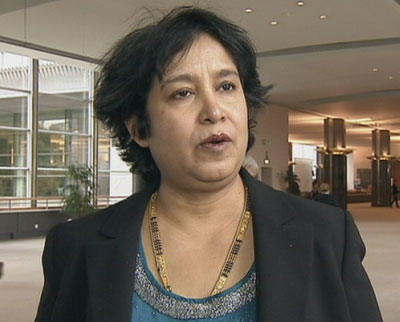 New Delhi:
New Delhi: Renowned Bangladeshi writer Taslima Nasreen has fled India for the United States, marking a new phase of her exile since 1994, when Islamic fundamentalists first threatened to kill her for her novel Lajja.
Nasreen announced her relocation via Twitter on Wednesday, following fresh death threats from the same Al Qaeda fundamentalists who are believed to be responsible for the murders of three liberal bloggers in Bangladesh earlier this year.
The writer says she tried to meet Indian authorities to seek extra protection, but was never granted any appointments.
Helped by US advocacy group, the Centre for Inquiry (CFI), Nasreen arrived safely in New York last week after leaving New Delhi, where she had been living in an undisclosed location for the past year.
“Will be back when feel safe,” Nasreen tweeted, without announcing a date of return.
Ronald A Lindsay, the president of CFI, promised that his staff were “doing all we can to keep her out of harm’s way”.
“Because of the very real danger to her life, Taslima has decided to leave India,” Mr Lindsay said. “For the indefinite future, to preserve her life, she will need to stay in the United States – where she currently has no job or home.”
“Her safety is only temporary if she cannot remain in the US, which is why CFI has established an emergency fund to help with food, housing and the means for her to be safely settled,” he added.
Nilanjana Roy, a New Delhi-based writer who in 2013 helped found PEN New Delhi – a chapter of a global association of writers that promotes free speech – said that the latest threats were probably linked to Nasreen’s ongoing defence of the Bangladeshi bloggers.
Most recently, on Tuesday, Nasreen tweeted: “Bangladesh govt should take action against the killers, and provide security to atheists / bloggers who are threatened by Islamists.”
Roy said that Nasreen’s tweets alone could have been enough to provoke the extremist group.
“Anything – a tweet, a statement, sometimes just the person’s presence – can be picked up and interpreted as provocation, not just a book,” she said.
“Taslima does not need to do anything, write anything, or express any new opinions in order to be unfairly and often monstrously targeted: the fact that she is the author of Lajja has been enough to set off fresh waves of attacks and threats against her, often on ridiculously slender pretexts.”
A physician by training, Nasreen began writing poetry in the early 1980s.
She produced four novels before Lajja, which means “shame” in Bengali, was published in 1993. The book is about anti-Hindu riots in Bangladesh, orchestrated by Muslims, that destroyed the secular fabric of the country.
Nasreen has also written articles against Islamic orthodoxy, and when Lajja was published, Islamic groups announced rewards for anyone who could kill her.
Muslims make up more than 90 per cent of Bangladesh’s population of 160 million people although it is officially a secular country.
In 1994, Bangladesh banned Lajja, and the government filed a suit against Nasreen under section 295A of the penal code, which deals with “deliberately and maliciously” offending religious sentiment. Nasreen could have faced up to two years in jail, but before the guilty verdict was announced, she left Bangladesh for Sweden. She has never returned.
For the first ten years of her exile, Nasreen lived in North America and Western Europe, moving through different countries and universities. When her Bangladeshi passport was revoked, Sweden granted her citizenship.
Nasreen continued to write. In 2002, the publication of her memoir Dwikhandita (“Split Into Two”) generated renewed protests, because she wrote, often critically, about the relationship between the Prophet Mohammed and his wives.
In 2004, India granted her a visa, and Nasreen lived in Kolkata until 2007, when violent protests by Muslims against her and her books forced her to leave. That same year, she was attacked by a mob that stormed into her book launch in Hyderabad.
She moved to Jaipur and then New Delhi, declining a trip to Paris to receive the Simone de Beauvoir award for her writing on women’s rights. At the time, she complained in an interview to Reuters that she was being kept under virtual house arrest in Delhi, where she was not allowed visitors and was not permitted to leave her house, which was under heavy police protection.
“I have not committed any crime, so why have they locked me up?,” she said.
While Nasreen was able to spend some time in Sweden and New York, she always returned to New Delhi, claiming that she belonged here.
“I was forced to stay in Western countries, but I never felt at home there and that is why I want to stay on in secular India,” Nasreen said in 2008.
Muslim clerics in India have repeatedly called upon the government to turn Nasreen out of the country. In 2007, the All India Muslim Personal Law Board, an influential non-profit that seeks to protect Muslim law, said that the government “should neither extend her visa nor grant her citizenship ... or members will be compelled to take to the streets and demonstrate”.
But by and large, Ms Roy said that “Indian governments have provided her with security and protection in the recent past.” # Source: The National, Samanth Subramanian
 New Delhi: Renowned Bangladeshi writer Taslima Nasreen has fled India for the United States, marking a new phase of her exile since 1994, when Islamic fundamentalists first threatened to kill her for her novel Lajja.
New Delhi: Renowned Bangladeshi writer Taslima Nasreen has fled India for the United States, marking a new phase of her exile since 1994, when Islamic fundamentalists first threatened to kill her for her novel Lajja.